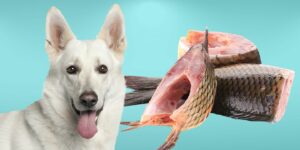Yes, dogs can eat cooked salmon in moderation. Salmon is a healthy and nutritious choice for dogs, as it is an excellent source of protein, omega-3 fatty acids, and several vitamins and minerals. However, salmon should be cooked before feeding it to your dog, as raw salmon can contain harmful parasites and bacteria.
Can Dogs Eat Cooked Salmon?
The Importance of Cooking Salmon
Cooking salmon is essential to ensure your dog's safety, as raw or undercooked salmon can contain parasites and harmful bacteria that can cause illness. Cooking the salmon will kill these parasites and bacteria, making it safe for your dog to eat.
Raw vs. Cooked Salmon
While some pet owners may choose to feed their dogs a raw food diet, it is not recommended to feed raw salmon to dogs. Cooked salmon is a safer option, as it significantly reduces the risk of parasites and bacteria that can be harmful to your dog's health.
How Much Salmon Can Dogs Eat?
Determining the Right Portion Size
The amount of salmon that you can feed your dog depends on their size, weight, and activity level. As a general rule, salmon should only make up a small part of your dog's diet, as overfeeding can lead to obesity and other health problems.
Frequency of Feeding Salmon
It's best to consult with your veterinarian to determine the appropriate portion size for your dog. They can recommend the right amount of salmon based on your dog's specific nutritional needs.
How Should Salmon Be Prepared for Dogs?
Removing Bones and Skin
When preparing salmon for your dog, it's important to remove any bones and skin, as these can be choking hazards. Salmon should be cooked thoroughly to kill any harmful bacteria or parasites.
Cooking Methods for Salmon
Baking
Baking is a simple and healthy way to cook salmon for your dog. Simply place the salmon on a baking sheet, cover with aluminum foil, and bake at 375°F (190°C) for 15-20 minutes, or until the salmon is cooked through.
Boiling
Boiling salmon is another easy and healthy option. Place the salmon in a pot of boiling water, and cook for 5-10 minutes, or until cooked through.
Grilling
Grilling salmon can provide a delicious flavor for your dog to enjoy. Make sure to cook the salmon thoroughly, turning it occasionally to ensure even cooking.
Mixing Salmon with Other Ingredients
You can feed your dog cooked salmon by itself, or mix it with their regular dog food. Some people also like to mix cooked salmon with other healthy ingredients, such as cooked sweet potatoes, brown rice, or vegetables.
Potential Benefits of Feeding Salmon to Dogs
Protein Content
Salmon is a rich source of high-quality protein, which is essential for maintaining your dog's overall health, and for building and repairing muscles and tissues.
Omega-3 Fatty Acids
Skin and Coat Health
Omega-3 fatty acids found in salmon can help support healthy skin and a shiny coat, reducing the risk of dryness and irritation.
Joint Health
These essential fatty acids can also help improve joint health, reducing inflammation and discomfort.
Cognitive Function
Omega-3 fatty acids may also support your dog's cognitive function, promoting healthy brain activity and potentially reducing the risk of cognitive decline as your dog ages.
Vitamins and Minerals
Salmon is a good source of several vitamins and minerals, including B vitamins, vitamin D, and selenium, which can help support your dog's overall health.
Potential Risks of Feeding Salmon to Dogs
Allergic Reactions
Some dogs may be allergic to salmon, leading to itching, vomiting, diarrhea, or other adverse reactions. If you suspect your dog is allergic to salmon, consult with your veterinarian.
Mercury Levels
Salmon can contain high levels of mercury, which can be harmful if consumed in large amounts. However, occasional, moderate consumption of salmon should not pose a significant risk to your dog.
Parasites and Bacteria
As mentioned earlier, raw or undercooked salmon can contain harmful parasites and bacteria. Always cook salmon thoroughly to minimize this risk.
Overfeeding and Obesity
Overfeeding your dog with salmon can lead to obesity and associated health problems. Feed your dog salmon in moderation, and consult your veterinarian to determine the appropriate portion size.
Alternatives to Salmon for Dogs
Other Fish Options
Other fish options, such as sardines, mackerel, and herring, can also provide similar health benefits for your dog, as they are also rich in omega-3 fatty acids and protein.
Fish Oil Supplements
If you prefer not to feed your dog actual fish, fish oil supplements can be a convenient alternative to provide your dog with the benefits of omega-3 fatty acids.
Tips for Introducing Salmon to Your Dog's Diet
Start with Small Amounts
Introduce salmon to your dog's diet slowly, starting with small amounts to see how your dog reacts.
Monitor for Adverse Reactions
Keep an eye out for any adverse reactions or allergies, such as itchiness, vomiting, or diarrhea. If you notice any issues, stop feeding salmon to your dog and consult with your veterinarian.
Consult Your Veterinarian
Always consult with your veterinarian before making any significant changes to your dog's diet.
Conclusion
Overall, cooked salmon can be a healthy and nutritious addition to your dog's diet, as long as it is fed in moderation and properly prepared. Always consult with your veterinarian before making any changes to your dog's diet.











